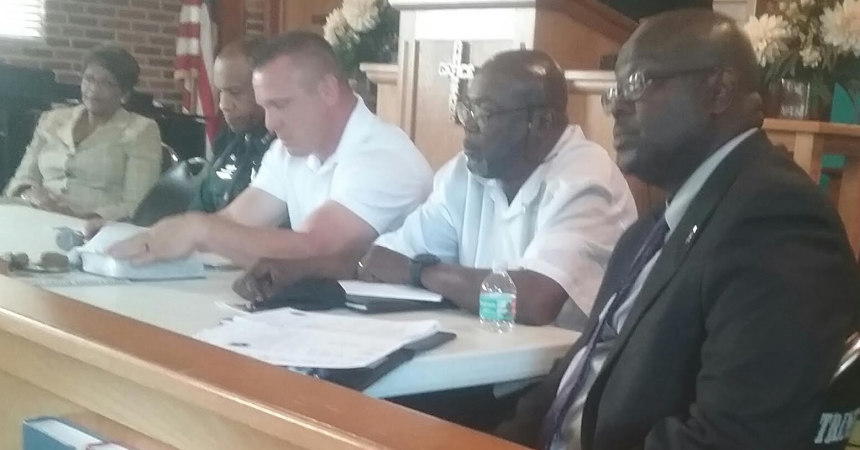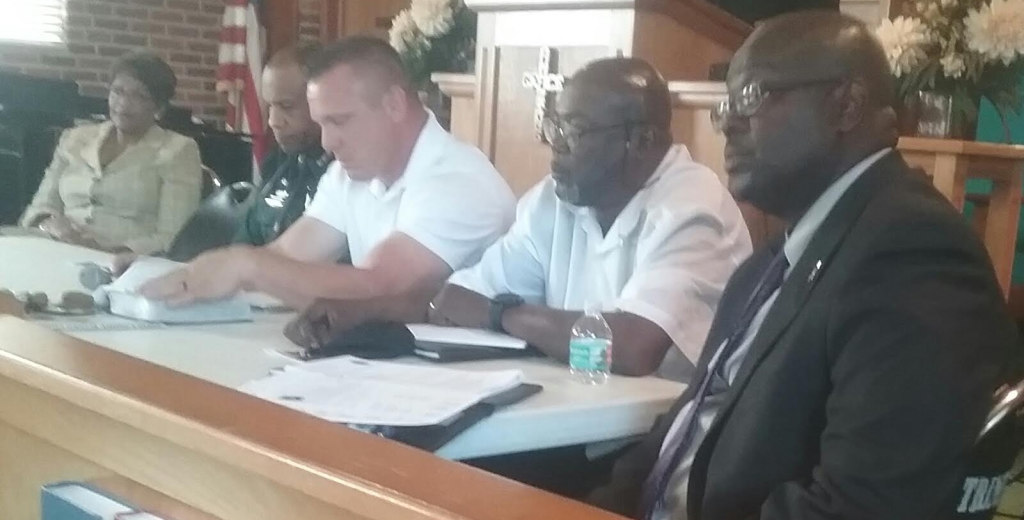
Sheriff McNeil calls on churches, community to step up push to assist ex-felons’ return

Members of the panel take questions from the audience at Trinity United Presbyterian Church during a symposium on ex-felons’ re-entry into their communities.
Photo by St. Clair Murraine
By St. Clair Murraine
Outlook staff writer
Community and church involvement could be the biggest step to helping ex-felons successfully restore their lives in society, Leon County Sheriff Walt McNeil told an audience in a nearly-packed Trinity United Presbyterian Church.
McNeil made his appeal for restoration last Thursday night as one of the panelists during a sometimes heated discussion on the topic: “I’m back, now what.” The two-hour symposium focused on many of the problems ex-felons face after they’re released from prison.
Panelists, including judge Barbara Hobbs, questioned the effectiveness of a handful of re-entry programs in the state. They also raised concerns over the benefits of current re-entry programs offered by the state compared to restorative justice, which requires community engagement several months or even years before a prisoner is released.
McNeil, seemingly vexed by several years of attempting to find a sustaining solution that does more to get ex-offenders back in society, said there is no overnight fix.
“All I’m here to tell you tonight is that you and us are the solution,” McNeil said. “These are our brothers and sisters and as long as we allow them to come back and we are comfortable coming out to our churches and putting money in the plate but we are not concerned about making sure our brothers and sister are getting what they need, then this (recidivism) isn’t going to stop.
“We can talk about reforming the criminal justice system; you can talk about law enforcement’s need to change (but) we need to change.”
Trinity’s pastor Lee Johnson, who for several years has been an advocate for civil rights, agreed that the church is a good starting point, but suggested that it will take more than his church and another handful that are actively involved to get blanket change.
“Everybody is not cut out for this,” Johnson said. “Every pastor is not cut out for this. They do what they do and people like me do what I do.
“This (Trinity) is a place of change. Not just in hearts and spirit but as you can see it’s the reason you are here.”
The two –day symposium concluded Friday with discussions on the reality of re-entry, re-entry programs and the Black Chamber of Commerce’s effort to help match jobs for ex-felons. Pastor Kenneth Sharpton Glasgow was the keynote speaker.
On Friday, Hobbs used state and national statistics to point up why effective re-entry programs are essential to reducing recidivism.
Some of the facts she points out are: Florida has the largest prison population with more than 100,000 imprisoned as of four years ago, with thousands more in Florida jails; inmates spend an average of five years in incarceration, and Black males make up half of those incarcerated.
Hobbs went on to say that getting an ex-offender back into society would require six basic needs – employment, family, health, criminal justice compliance, social reconnections and residence.
“It is a big deal trying to get our folks back into society,” Hobbs said.
McNeil agreed that the six essentials that Hobbs mentions are important, but said the length of time that an ex-offender spends locked up could make it hard for someone to re-enter their community.
“All of those factors, in a huge way, are predictors in terms of whether or not that person is going to show back up in the criminal justice process,” McNeil said. “For all of those reasons, that’s why a holistic approach to persons re-entering our community from prison is essential. Particularly the notion of trying to do something with re-entry and doing that in a uniformed way that starts long before the person is a year or two years away from coming back into the community.”
McNeil’s sentiment was echoed by Dale Landry, president of the Tallahassee chapter of the NAACP and an advocate for restorative justice. Through restorative justice, ex-felons would be allowed to begin the re-entry process while they are incarcerated by getting an education and developing trade skills, Landry said.
“The most important thing is working your way back into the community so that you can be embraced and brought back in,” he said. “Not as somebody that’s an outsider but as somebody that has said, ‘I’m sorry and I’m ready to come back.’ ”
Having the support of family and taking responsibility of wanting to change also is a major factor in being accepted by society after incarceration, said Jeremy Smith. He spent 10 years in prison but it wasn’t until he sought change by attending a church, did his turnaround begin, he said.
“That has to come with severe change. It has to come with an application for change; not a speech,” said Smith, who lives in Wakulla and owns a business in Tallahassee. “Talk is cheap. You must apply these things otherwise there is no fruit (and) there is no evidence.”







